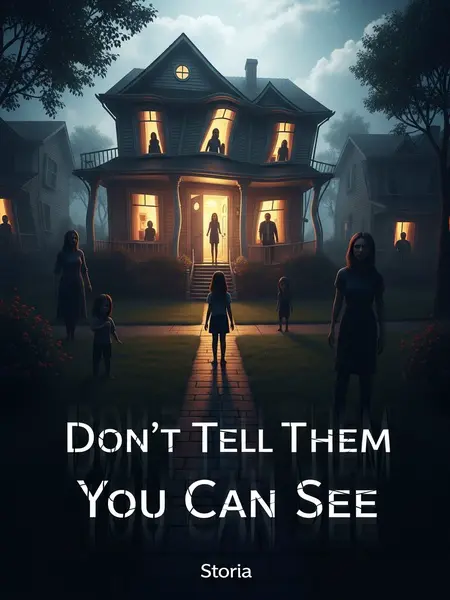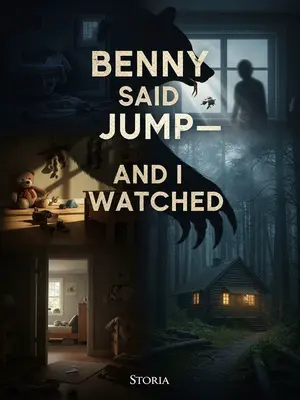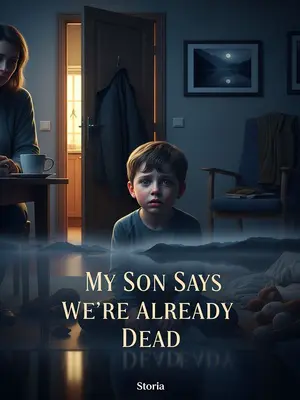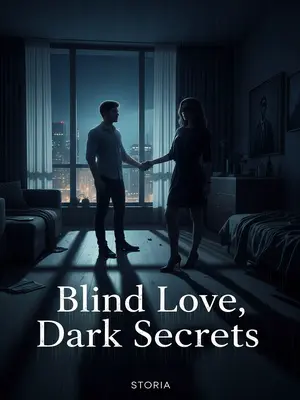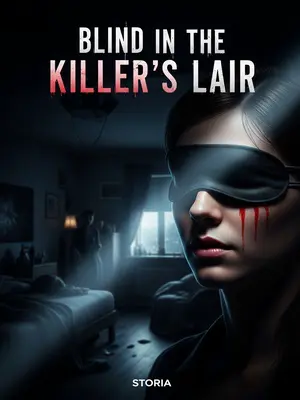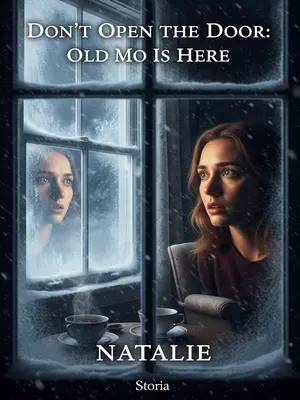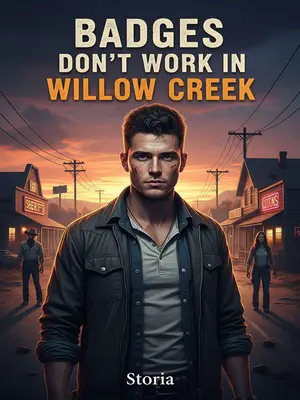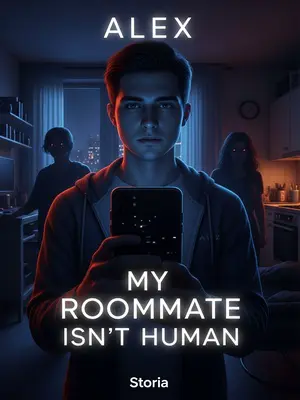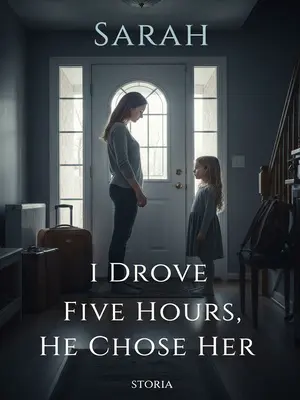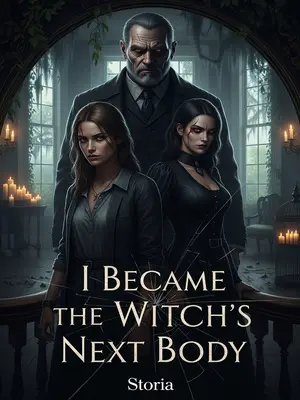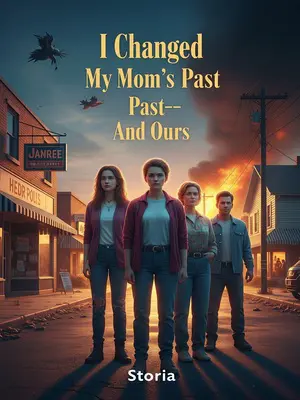Chapter 2: The Fifth Death
Time: 5:45 p.m.
You let out a long breath to calm your fear. This time, you didn't hesitate and went straight to the door.
Your jaw clenched, and you gripped the cane like a weapon. You marched to the door, ready for whatever waited on the other side. The old courage mixed with new, sharper fear.
After seeing that eye in the peephole again, something flickered in your mind, but you still opened the door in the end.
A memory, slippery and incomplete, danced at the edge of your thoughts—something about eyes, about being watched. But before you could grasp it, the knob turned under your palm, and the scene replayed: your parents’ faces, frozen and empty.
……
Time: 5:45 p.m.
You opened your eyes thoughtfully. Two consecutive deaths made you realize something.
The familiar ceiling greeted you, but this time, you didn’t panic. Instead, you let the moment settle, gathering the fragments of memory into something like a plan.
Your gaze drifted through the window, toward the endless dusk.
The sky outside was streaked with orange and purple, city lights flickering on in the distance. The world kept moving, but you were trapped, a bug in amber.
"Don't tell them you can see." The voice sounded again, slowly.
The words felt heavier now, threaded with urgency and warning. You pressed your hand to your chest, feeling the dull ache of your most recent fall, and promised yourself you wouldn’t ignore it again.
This was your third and fourth death.
Your parents would stop you from leaving, and it had nothing to do with the time. Your repeated deaths had already proven this.
You felt a cold certainty settle in your bones. No matter what hour you tried, the outcome was the same: the trap snapped shut, and you were back where you started.
You even began to wonder if they were really your parents.
You stared at the framed family photo on your desk, studying the lines of their faces, the way your mom’s hair curled at her ears. You realized you couldn’t remember the last time she’d laughed, or the last time your dad had made that dumb pun about the Chicago Bears. Doubt crept in, chilling and deep.
As the 6:00 bell rang, you tried to think deeper, but every time you recalled the past, your head throbbed with pain.
It was like pushing against a locked door in your mind—each memory you reached for brought a spike of agony, a headache blooming behind your eyes. You gritted your teeth, frustration boiling over.
It was as if your body resisted remembering through pain.
You massaged your temples, digging your thumbs in until your vision blurred. It was no use. The memories slipped away every time.
You couldn't even recall how long you'd been blind, or why.
You closed your eyes, grasping for details—what school you’d gone to, the last movie you’d watched, the time you’d broken your arm in Little League. All of it, gone, as if someone had wiped your slate clean.
Helpless, you gave up thinking, but the thick fog behind it all only made you more curious. You swore to get to the bottom of it.
You made yourself a promise, right then: as long as you kept waking up, you’d keep trying. No matter how many times it took.
Since the door was a dead end, you had to try another way: the window.
You glanced outside. The fire escape was too far to reach, but the balconies below yours made a sort of makeshift ladder—if you were careful. You eyed the bedsheets and comforter, already plotting your next move. Your heart beat with a strange, reckless hope.
Your home was on the sixth floor—not high compared to the taller buildings nearby. Each floor had an open balcony, so you could use a rope to climb down.
You double-checked the anchor point, looping the knotted sheets around the old radiator bolted to the wall. It felt solid enough. You tugged once, twice, bracing yourself. The old Chicago wind rattled the window frame, but you ignored it.
It took you half an hour to twist the duvet cover, sheets, and other fabric into a strong rope, secure it to a wall fixture, and make a simple rappelling device.
The makeshift rope—your old Bulls jersey knotted with flannel sheets—bit into your palms. Your hands shook with adrenaline as you tied the last knot. Sweat beaded on your forehead, even though the window let in a sharp chill. You tested the rope again, whispering a little prayer under your breath.
Time: 6:30 p.m.
As before, your parents came home at this time and started cooking.
You heard the clatter of pans and the murmur of voices drifting from the kitchen. The smells of garlic and onions wafted under your door. You bit your lip, nerves jangling, and called out that you weren’t hungry.
You called to them through the bedroom door that you weren't hungry and not to call you for dinner.
After their reply, you felt relieved.
Their voices were oddly flat—too even, too calm. But you let out a shaky breath anyway, counting each second as you waited for footsteps to fade away.
You tiptoed onto the desk, climbed to the window, grabbed the rope, and tightened your body, inching down bit by bit.
The wind whipped at your face, cold and sharp. You clung to the rope, knuckles white, heart pounding in your ears. The city lights blurred below you. You didn’t let yourself look down.
The dim yellow sunset shone on you. In these dozen meters of height, freedom outweighed fear.
The air tasted like freedom—crisp, electric, charged with hope. For a moment, you almost smiled, feeling a surge of triumph as you lowered yourself toward the next balcony.
You were more capable than you thought. After a few minutes, you were nearly down to the fifth floor.
Sweat trickled down your back. You paused, steadying your breath, focusing on the little victory—almost there. You risked a quick glance at your hands, surprised at how steady they were.
Next, you just needed to jump onto the fifth-floor balcony, go inside, open the door, and head downstairs.
You eyed the sliding glass door. You could almost see yourself inside—safe, one step closer to freedom. You counted down, readying your leap.
A young woman lived on the fifth floor. She worked late shifts, from 6 p.m. to 2 a.m. You'd chatted with her many times and knew her schedule. She definitely wouldn't be home now, so you could act without being discovered.
You remembered her stories about the hospital, her tired smile after long nights. You felt a twinge of guilt for breaking in, but told yourself it was just for a minute. You needed a way out.
You steadied your breathing, preparing for the final descent.
You told yourself you’d be careful, quiet as a mouse. You pictured the landing—one smooth jump, and you’d be inside. The plan was solid. You could do this.
But in the next moment, out of the corner of your eye, you saw an arm reach out from the balcony below and grab the rope.
The hand was pale, fingers long and stiff. You froze, heart dropping into your stomach.
You felt a violent jolt. As you fell, you glimpsed a lifeless face.
The face was wrong—expressionless, empty-eyed. Your scream died in your throat as gravity claimed you, the world spinning, the rope slipping away.
Bang—
With the heavy sound of impact, your vision was covered in blood, and you fell into darkness.
The last thing you felt was the cold, hard metal of the balcony railing, and then nothing at all.
……
Time: 5:45 p.m.
"Don't tell them you can see."
As the voice sounded again, you slammed your fist on the desk.
"Damn."
This was your fifth death.
You barely recognized your own voice—raw, furious, half-crazed. The word echoed in the silent room, bouncing off the windows and walls. For a second, you almost laughed at yourself.
Maybe you were getting used to dying. Your anger faded quickly, and you calmed down.
You ran your hands through your hair, counting each breath until the rage faded to dull resignation. You almost felt like a scientist, gathering data, running another trial. Just another reset.
This death showed you that escaping through the window was also impossible.
You tapped your finger against your thigh, ticking off every exit you’d tried. Each one had ended the same way: another brutal reset. You tried not to think about what would happen if you ran out of options.
Of course, you thought of more—like why the young woman on the fifth floor was home. Remembering your parents standing at the door before their workday should have ended, a thought flashed through your mind: maybe, they had never really left.
You pressed your forehead to the cool glass, eyes scanning the courtyard for signs of normalcy—a neighbor walking their dog, the mail truck rumbling by. But everything felt staged, like a low-budget movie set. Maybe you’d been trapped here longer than you remembered.
You slumped into your chair, staring at the yellowed poster.
You weren't sure if it was an illusion, but you thought the person in the poster seemed to... move a little.
You blinked, rubbing your eyes, but the image flickered again—LeBron’s gaze tracking you across the room. You shivered, unsure if you were losing your mind or finally seeing things clearly.
This death made you extremely cautious.
You checked every lock, every window, every shadow twice. You sat with your back to the wall, white cane within arm’s reach. You jumped at every sound from the hallway.
You didn't leave the bedroom, staying inside until 6:30 p.m. when your parents returned. After dinner, as usual, you turned on the radio, listened to an hour of old comedy radio, two hours of audiobooks, and finally fell asleep to an online class.
You let the static and laughter wash over you, trying to pretend you were just another college kid pulling a late night. The voices kept you company, drowning out the pounding of your heart. It almost worked.
The night was peaceful, and you woke up early.
For the first time in a long time, you didn’t wake with a jolt. The room was quiet, the early morning light slanting across your bed. You stretched, half-expecting pain, but there was only a dull ache.
As you were getting dressed, the door opened. Your mom entered, holding a carnation. She silently walked to your bedside, pulled the withered flower from the vase, and replaced it with a fresh one. The whole time, you never once looked directly at her.
You focused on the way the flower drooped in her hand, the tiny specks of pollen dusting her fingers. You kept your face neutral, eyes fixed on the floor.
Likewise, during the whole process, her gaze never left you.
You could feel her watching, every second stretching out like taffy. Her presence pressed in around you—intense, unblinking. Your skin crawled, but you didn’t flinch.
She's... watching me? you thought, but kept a calm face.
You replayed every move, careful not to let your eyes flick to her face, not to give anything away. You breathed through your nose, slow and even.
Morning, 7:30 a.m., was your parents' time to go to work. After a quick breakfast, they said goodbye to you.
Your dad kissed you on the forehead, your mom smoothed your hair. They smiled, but their eyes were wrong—unfocused, too wide. You forced yourself to wave as they left.
You sat at the table and said, "Be careful when you go out."
You tried to sound normal, tossing out the same line you always used. Your voice was steady, but your hands shook as you gripped your fork.
Hearing the door close, you put down your bowl and fork, ready to return to your room. But the moment you turned around, a chill shot down your spine, sweat prickling your skin.
They were standing at the door like two stone statues, staring at you intently.
The hallway light cast long shadows behind them. You froze, halfway between the kitchen and your bedroom, trapped like an animal in a spotlight. Their eyes tracked you, unblinking, their bodies too still—like mannequins waiting for someone to pose them.
You dared not make a sound, clutching the white cane in your hand, your palm sticky with sweat, as if holding a live fish.
You focused on keeping your breathing slow, each inhale a struggle. The cane felt slick and heavy. You willed yourself not to drop it, not to give in to panic.
What should I do? What should I do? What should I do?
The question looped through your mind, over and over, louder than your racing pulse.
Your mind raced.
You ran through every possible escape plan, every lie, every half-remembered bit of advice from TV or your old therapist. None of it seemed to fit.
In the end, you did as usual, went back to your room for the key, and prepared to go downstairs to listen to audiobooks with Mr. Chapman.
You forced yourself to move, step by careful step. You didn’t look up, didn’t hesitate. You slipped the house key into your pocket, hoping your parents would buy the act.
This was one of your usual activities.
You told yourself it was just a normal day—just a kid with a white cane, heading out to pass the time. If you acted like everything was fine, maybe it would be.
There was a basketball court in the apartment complex, but few people played basketball, so it became a gathering place for older men and women to play chess, chat, and bask in the sun. Compared to home, you obviously preferred it here, because here there were voices and life.
You remembered how the laughter carried on the breeze, the smell of cheap coffee in Styrofoam cups, the faint slap of dominoes on plastic tables. You missed the warmth, the noise, the easy companionship of people who didn’t care about your blindness.
You left easily. Your parents didn't stop you, instead making way for you.
They stepped aside in perfect unison, their faces blank. The hallway felt colder than ever. You kept your eyes glued to the floor, resisting the urge to run.
They followed behind you like two shadows, silent.
You felt their presence at your back, silent and suffocating. Every step down the hall felt like walking through a dream that could turn to nightmare at any second.
The further you went, the colder you felt.
The old radiator groaned, but the chill in the air didn’t fade. Your breath fogged in front of you, even though it was early fall and the heat should have been on by now.
In the old, dim corridor, people stood in front of every door on every floor, standing in the shadows, staring at you with lifeless eyes.
You tried not to meet their gaze, but you could feel it—dozens of eyes tracking you, judging you, waiting for you to slip up. They didn’t move, didn’t blink. It was like being in a wax museum at midnight.
You felt as if you had wandered into a bat cave, drawing closer to hell with each step down.
Your footsteps echoed on the tile. You tried to tune it out, focusing on the memory of sunlight and laughter waiting for you outside. But the darkness pressed in from all sides.
Behind you were countless shadows, but there was no light ahead.
No matter how fast you walked, the hallway never seemed to end. The emergency exit sign flickered overhead, casting a sickly green glow on the linoleum. You gripped the cane tighter, praying you wouldn’t have to use it for anything other than walking.
Time: 9:00 a.m.
You and Mr. Chapman sat side by side on a bench by the basketball court, a radio at hand emitting a sandy, grating sound.
The cool wooden slats creaked under your weight. You let your shoulders drop, grateful for the old man’s company, for the brittle crackle of the radio’s static. The air smelled like fresh-cut grass and distant car exhaust.
An old comedy routine began to break up.
The familiar cadence of 1930s banter filled the air. The punchlines were cheesy, but you laughed anyway—anything to fill the silence.
You and Mr. Chapman chatted off and on, occasionally sharing a laugh.
His voice was soft, with the slow drawl of a man who’d seen a lot and didn’t feel the need to hurry. He told you about the time he’d gotten lost in downtown Milwaukee, about the neighbor’s dog that wouldn’t stop barking at mailmen. For a little while, you almost forgot where you were.
A thick cloud blocked the sun, casting a shadow. It should have been an ordinary morning—sunshine, autumn breeze, voices all around. You wouldn't have felt lonely.
But the light faded, and the easy chatter died away. The laughter turned brittle. The world seemed a little less real with every passing minute.
Only the stiff curve of your lips betrayed your discomfort. In your sight, your parents and the residents of your building all stood quietly under the trees, motionless. The older men and women sat on folding stools, chatting, occasionally glancing at you. The early autumn air was still warm, with a hint of lingering summer, but cold sweat trickled down your back.
You shivered, glancing at your sneakers, willing your face to relax. You knew you should be grateful for the ordinary, but the weight of all those eyes on you made your skin crawl.
You couldn't stand being watched for long. You leaned back on the bench, tilted your head, and watched the clouds drift by.
The sky overhead was endless, shifting from blue to gold as the sun fought through the clouds. You traced the patterns, letting your mind drift. For a moment, you felt almost free.
Maybe only the changing clouds could help you relax.
You counted the shapes: a dog, a dragon, a sailboat. The clouds didn’t care if you could see. They just drifted, untouchable and safe.
Gradually, you let yourself unwind and began to think about your next move.
You weighed your options, cataloging every possible escape, every person who might help you. You made a mental list of allies and threats, replaying each conversation for hidden meanings.
Though you didn't fully understand, it seemed that as long as no one discovered you could see, you were safe.
You tested the theory, glancing out of the corner of your eye at the others. Their faces were empty, their eyes dull. As long as you played the role, nothing changed.
Time ticked by. The first ray of dazzling light pierced the clouds and shone on your face. Instinctively, you raised your hand to shield your eyes.
You flinched, throwing up a hand to block the glare—an old habit, one you hadn’t needed in years. You felt the warmth flood your skin, the bright spot burning against your eyelids. Your hand shot up without thinking, a reflex you couldn’t suppress.
At that moment, all the voices around you abruptly ceased.
It was as if someone had pressed pause on the world. The laughter, the rustle of newspapers, even the radio—gone in an instant. The silence was thick enough to choke on.
Every face in the courtyard turned to you at once. The silence was suffocating, like the whole world was holding its breath, waiting for you to slip.
You looked up, startled, and every single person—old Mr. Chapman, the kids on the jungle gym, your parents under the trees—had fixed their gaze on you. The air felt electrified, the world holding its breath.
In the eerie silence, only the radio crackled.
You clung to the sound, desperate for anything normal. But the voices never returned, just static and the faint pop of a loose wire.
Your heart began to pound, as if a nameless terror was about to descend. You hurriedly said goodbye to Mr. Chapman and left in haste.
You mumbled a quick excuse—"Gotta run, see you tomorrow"—and stumbled away, head down, cane tapping furiously. You didn’t look back.
It wasn't until you closed the door behind you that you finally calmed down.
Inside your apartment, the familiar smells of dust and old carpet helped settle your nerves. You pressed your back against the door, letting the panic fade away.
After that, you spent the day on edge, not daring to do anything else until bedtime.
You stayed inside, blinds drawn, jumping at every sound. You forced yourself to eat, to listen to the radio, to pretend everything was fine. But your hands never stopped shaking.
You thought the day's events were over, and mental exhaustion finally carried you to sleep.
Your eyelids drooped. You tried to count sheep, but every one of them had your mother’s eyes. Eventually, sleep claimed you.
Early morning, 2:00 a.m.
Half asleep, you heard a faint rustling, and woke up alert, and
You froze, the sound growing closer. Something—or someone—was in your room. And this time, you weren’t sure you could pretend anymore.
